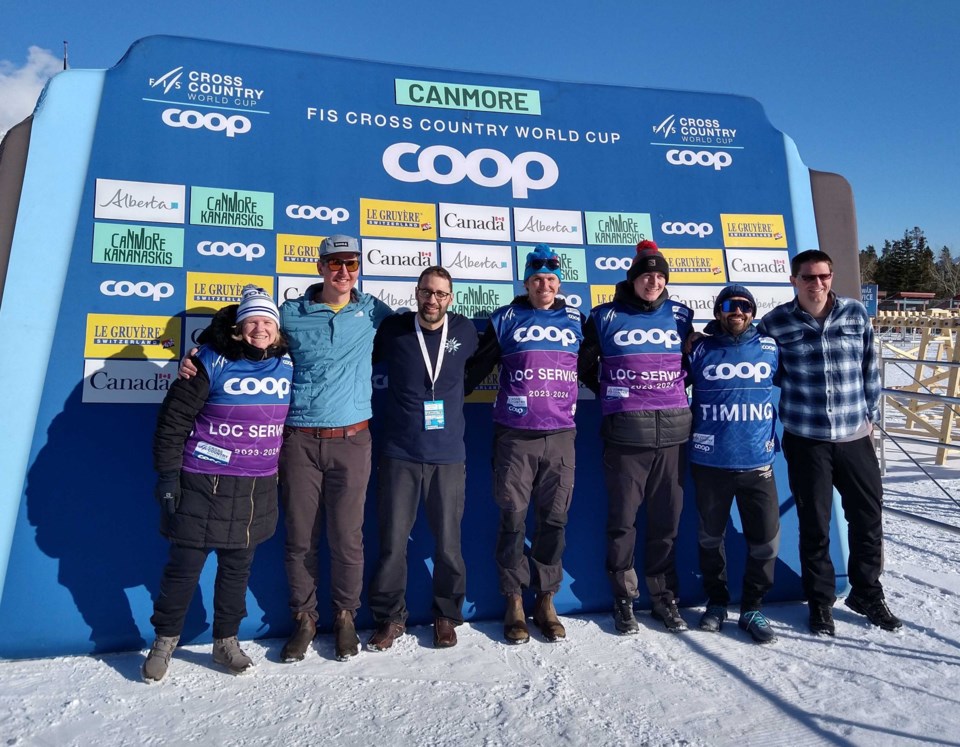CANMORE – Murphy’s law is a commonly accepted truth that whatever can go wrong, will go wrong.
It's an adage that the Alberta World Cup Society, organizers of the recent cross-country skiing World Cup, must be quite familiar with by now.
Leading up to the FIS COOP Cross Country World Cup in Canmore, unseasonably mild weather appeared to be the frontrunner to make a mess of things, with slushy and unfavourable conditions for athletes and subsequent headaches for organizers.
But then cooler temperatures arrived and with the frost came snow and all was well in the land of World Cups … for about two days. Like a bad rash, Murphy’s law re-emerged again, with a devilish grin, and laughing evilly.
The Canmore World Cup might have looked very differently if it weren't for local company Zone4 and their efforts to save the day.
“There was a rumour floating around Monday (Feb. 5) that something was up. We got the call Tuesday,” said Dan Roycroft, creator and operator of Zone4.
Zone4, which many recognize as the go-to website for race results and timing for various sports events, jumped into action when the effects of a workers strike at a German airline was felt halfway around the world.
As ground staff for Lufthansa picketed Feb. 7-8 over a pay dispute, about 5,000 lbs. worth of production equipment was stuck at a Frankfurt airport. The problem is that gear was supposed to be in Canmore.
Owned by Swiss Timing, a production company that regularly works with the International Ski and Snowboard Federation (FIS), it became obvious the gear wasn’t going to make it in time for Friday’s race in the mountain town hosting its first cross-country World Cup in eight years.
The options were to cancel Friday's live broadcast – which has a global cumulative audience each season in the hundreds of millions – or work day and night with Zone4 and cram in an entire month’s work in just a few, hectic days.
“This race is so important to so many people who have worked so hard to make this happen," said Roycroft. "This is our hometown, this is our home World Cup, so if we could do one little thing to make that event go that’s the most important thing."
TV production was the major component needing attention, meaning pop-up graphics, names, speeds, live-timing, where skiers are on the course, instant replays, etc. It all needed to be programed from scratch. It's much different than what Zone4 does, which usually fits all their equipment in one duffel bag instead of truckloads like Swiss Timing, but the two teams worked together to make things happen. The local company also had gear shipped in to aid in their efforts.
“In their world, if it didn’t happen live on TV, it didn’t happen,” said Roycroft. “You could get it right five seconds later, but it’s too bad, you missed the moment.
“So what we were doing at this World Cup, we were writing the timing and they were able to distill all their complexity onto one laptop and try to do the graphics off one laptop and that’s all they had when they arrived was seven people and two laptops. That's how we made this work.”
To make things less risky for broadcast, Friday’s interval races became a mass start day instead. The big moment of truth came during the first lap of the first race.
“They were coming to the split and, you know, this is the moment everything needs to come on the screen right there,” said Zone4's Etienne Richard. “It was super quiet in the room and then boom, boom, boom, it came up like a normal World Cup and everyone kind of took a deep breath and we were all so stoked. We were really proud of being part of the team and being a part of the event.”
Swiss Timing's equipment eventually showed up for day two after the brief strike had ended.
Norbert Meier, events chair for the Alberta World Cup Society (AWCS), said it was stressful leading to the first race, with all the uncertainity factoring in. However, he praised Zone4 for coming to the rescue in a "very challenging situation."
“FIS told us that they were so happy that this happened in Canmore because Canmore is the kind of place where solutions could be found,” said Meier.
"Without Zone4, it would have been a very different scenario."




